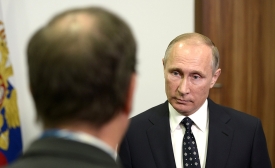misinformation
An embattled anti-propaganda unit intended to combat Russian and Islamic State militant group (ISIS) misinformation is losing key staff even after Secretary of State Rex Tillerson began to fund the program at the urging of Congress. Nash Borges, chief technology officer at the anti-propaganda Global Engagement Center’s (GEC), left the unit last Friday according to Defense One, which obtained a copy of his final email to staff.
RT’s coverage may seem shoddy, at times even comical, but it serves its propaganda function efficiently. Media failures over the Iraq War and the financial crisis have disenchanted audiences, making them cynical and distrustful. The cynicism, however, has made them credulous toward those who present themselves as critics of the “mainstream media”...
The journalistic standards and values that CBC-RC represent are crucial in this era of misinformation. In order to uphold these values and the trust Canadians put in us, we must invest even more in fact-checking, in-depth reporting and investigative journalism.

As the President-elect wades into foreign policy, criticism of Putin is noticeably absent.

According to Markos Kounalakis, America's news ecosystem is segmented and locally-focused, leading to less knowledge of global events.
There are a number of myths about terrorism and radical Islam, established in Russian society. This article is an attempt to articulate some of myths but not all of them. Among others, I have to emphasize the following: terrorism equals crime, terrorists are mentally ill, all terrorists are Muslims, and US is one of the main sponsors of terrorism.

A new plan for countering propaganda has been introduced in the U.S. Senate, but how necessary is it?







